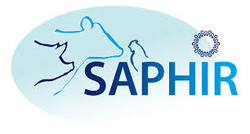Sustainable food security - SAPHIR
H2020 SC2 FOOD
Strengthening Animal Production and Health Through the Immune Response (SAPHIR) is a European research project that aims to develop innovative, safe, affordable and effective vaccine strategies against endemic pathogens responsible for high economic losses in livestock. Therefore, SAPHIR brings together the interdisciplinary expertise from fourteen academic institutes, five SMEs, one pharmaceutical company and a forum of animal breeders. The project is coordinated by Dr. Isabelle Schwartz-Cornil and runs from March 2015 until February 2019.

SAPHIR aims to tackle current vaccine weaknesses and develop generic vaccine-based strategies -such as adjuvants, vaccine vectors and delivery methods- that can be applied to a large array of pathogens. These strategies will be demonstrated in representative livestock pathogens that impose a high economic impact all over the world: Porcine Reproductive and Respiratory Syndrome Virus (PRRSV) and Mycoplasma hyopneumoniae in pigs, Eimeria and Clostridium perfringens in chickens, and Bovine Respiratory Syncytial Virus (BRSV) and Mycoplasma bovis in cattle. At the end, SAPHIR hopes to deliver new vaccines and biomarkers for future developments beyond SAPHIR and which will aid in strengthening the profitability of food animal systems, improve animal welfare and reduce xenobiotic usage in farming.
SAPHIR gathers an outstanding network of animal health sociologists and economists, virologists, microbiologists, parasitologists, immunologists , mathematicians for modeling, vaccine formulation specialists and veterinarians who are all focused on the same goal: reaching vaccine effectiveness.
Objectives
These are the objectives of SAPHIR:
- Scientific objectives: to unravel mechanisms of immune protection, induce rapid and long-lasting immunity, develop safe vaccines and predict epidemiological consequences of vaccination.
- Technical objectives: to generate models and assays for the development of vaccines, to investigate a variety of vaccines and delivery systems and to bring promising vaccines to demonstration.
- Socio-economic objectives: to explore the economic impact of the SAPHIR diseases and to predict the socio-economic benefits of using the designated vaccination strategies.
Role of Ghent University
Ghent University is one of the academic institutes participating in SAPHIR. Three professors of the Faculty of Veterinary Medicine act as work package leader of three different SAPHIR work packages. They also are the promotors of PhD-students working on the project.
Contact
Prof. Hans Nauwynck
Department of Virology, parasitology and immunology
Phone number: +3292647373
E-mail: Hans.Nauwynck@UGent.be
Prof. Dominiek Maes
Department of Obstetrics, reproduction and herd health
Phone number: +3292647542
E-mail: Dominiek.Maes@UGent.be
Prof. Filip Van Immerseel
Department of Pathology, bacteriology and poultry diseases
Phone number: +3292647447
E-mail: Filip.VanImmerseel@UGent.be